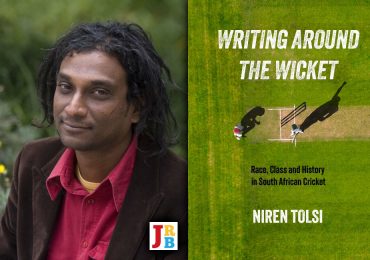It happens that words become too inconsistent to communicate shock. Not that we can’t guess at the terrifying explosion, whose blast could ravage everything in its path. But it is far away, it is other, it is elsewhere.
Then we become conscious that the aftershock, the blast, could crush us all.
The assassination of George Floyd took place before our terrified eyes. For almost nine long minutes, a man, with his hands in his pockets, imbued with destructive certainty, kept his knee on the neck of another, who was forbidden to defend himself. George Floyd cried; begged; said he couldn’t breathe. In desperation, he called out like a lost child to his mother, who’d passed away. At no moment did that man rebel against his fate, resist. Was he hoping that if he called out to the shred of humanity supposedly buried inside us all his huge black body, sick and battered, would seem less menacing? Derek Chauvin did not hear him. During those endless minutes, with detachment and that impassive face, he killed him. A holocaust, this one with a little ‘h’—for when it is a beast being killed. Did George Floyd, an African American man, his subconscious lulled by the sound of Nina Simone’s Strange Fruit, know that his name would be inscribed at the bottom of a long list of hateful murders? Did he think, ‘It’s my turn’, as if it had always been written?
Amid a series of events without apparent links, my mind made a link with the virus that for some long weeks imposed silence on us. Not on the whole world: it was the West that went quiet, shocked and almost indignant that for once in our contemporary history the ill did not stop at its borders. That it had to be the one to tremble and lock itself down, while others, used to all sorts of crises, seemed, against all hope, to be standing up to this one. A black person who is killed on the streets because they met the wrong people is almost a banal fact. The unrest and the indignation that followed were not.
The blast. The unexpected reach of the tremor. Something in us, something fragile and vulnerable, something that can only be protected by justice, solidarity, brotherhood, was snuffed out on that sidewalk.
Derek Chauvin, in the evident serenity of his act, extinguished the promise of a rainbow world with no more qualms than we would blow out a candle before leaving a room. And while the Derek Chauvins from every country, and of all races, kill the George Floyds who cross their paths with impunity, this time the world saw.
And the world trembled.
A big shiver of fear, of disgust and of rage, aggravated by the months of feeling the fetid breath of death on our necks. In this unusual context, the George Floyds and the Derek Chauvins each broke out of their prescribed roles. The George Floyds no longer wanted to be defenceless victims; the Derek Chauvins were fearful of the new fact that opprobrium suddenly does not distinguish between the powerful and the powerless. We were thrown into a reality where any of us, randomly selected, could become prey or predator.
The quotation that provided the title of the book by James Baldwin that everyone has been mentioning since the beginning of this tragedy comes from the Bible. The vengeful God of the Old Testament, after drowning man, animals, plants—every living thing except the elect in the ark—promises that this will never happen again. He renews his covenant with the people: next time it won’t be water, but fire. That might sound like a threat, but perhaps is it a promise? White privilege does not bother with the position of the white man in his society and the social injustice he may encounter there. Rather it deals with the luxury of deafness, blindness and ignorance that the white man can afford, vis-à-vis those who are not white. When the colour of your skin forces you into permanent vigilance, when you are able to describe in minute detail the advantages that those who benefit from them cannot even see—in the same way, Black Lives Matter means that in order for every life to matter those of black people must not be minimised. It is not for love that thousands of people protest around the world. Black people are not asking to be loved beyond reason. The protesters are simply explaining that until black lives are respected and protected like those of anyone else, none of us are safe. If George Floyd cannot breathe, no one will be able to breathe. The unruffled assassins will never stop.
Next time, fire: the promise of a great blaze that will illuminate the underworlds of our souls. Maybe. Prophecies only make sense after the event. Are we already in the after? Let’s be careful not to hasten proceedings. One thing is certain, and maybe this is what overwhelms us so much: a part of us sees ourselves in the cries of George Floyd, in the misery of the world and in our collective powerlessness. And the other part is Derek Chauvin, the impassive murderer. We are the slap and the cheek, the knife and the wound, as Baudelaire would say. Our baffled humanity knows deep within itself just how these two contradictory extremes coexist. It is a long and terrible history of racist violence that no one knows how to heal. It is also the story of gasping for breath, of the collective impossibility of breathing as long as others are deprived of air. Is that not what this Covid-19 lockdown constrained us to? A long apnoea, until the air becomes breathable again, for everyone?
—Translated from the original French, first published by Jeune Afrique, by Edwige-Renée Dro.
- Hemley Boum was born in Cameroon. She studied anthropology at the Catholic University of Central Africa in Yaoundé and international trade at Lille Catholic University. She lives in Paris. Her critically acclaimed novel Les Maquisards won the Prix du livre engagé de la Cene Littéraire and the prestigious Grand Prix Littéraire de l’Afrique noire. The English rights to her most recent novel Les Jours Viennent et Passent have been acquired by Bakwa Books, and the English edition will be published in 2022.
- Edwige-Renée Dro is a writer, a literary translator and a literary activist from Côte d’Ivoire. She was identified in 2014 by the Hay Festival as part of Port Harcourt being a UNESCO World Book Capital as a writer “with the potential and talent to define trends in the development of literature from Africa and the diaspora”. Edwige has judged and facilitated many writing competitions, such as the PEN International Short Story Prize or the AfroYoungAdult project for the Goethe-Institut in South Africa. Her writings have been published by Bloomsbury, HarperCollins and in magazines like Popula, This is Africa, etc. One of her fantasies having always been to be locked up in a library, she set up in February this year, 1949, a library of women’s writings from Africa and the black world. Beyond fulfilling her fantasy, the library’s purpose is to unearth and shine the light upon the contributions of African and black women to the world in order to inspire the present and the future generations.





